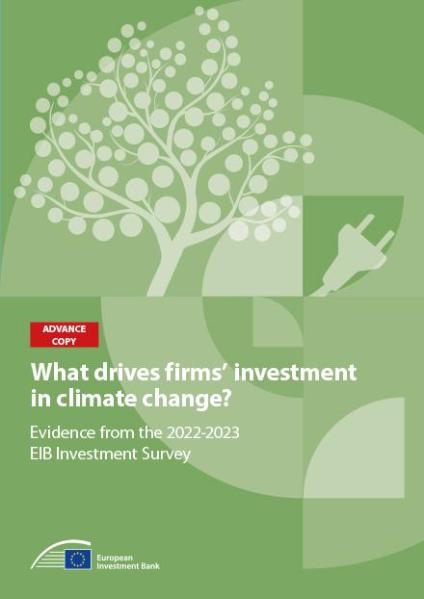
- The share of European firms investing in climate action has reached 53% on average. This equates to increase of 10 percentage points compared to 2021.
- Central and Eastern Europe has seen a particularly sharp increase, as have investments by small and medium-sized enterprises.
- Energy-intensive manufacturers have a stronger appetite for climate investments than non-energy intensive firms.
- However, high uncertainty is weighing on companies’ investment decisions on climate action.
The European Investment Bank (EIB) Climate Investment Report for 2022-23 (EIBIS Climate) shows that the rise in the share of firms engaging in climate action (including energy efficiency) accelerated in 2021, a post-pandemic rebound that is expected to continue. Over the last year, the share of European firms investing in climate has increased by 10 percentage points, reaching 53% on average. The increase has been particularly pronounced in regions such as Central and Eastern Europe (up 15 percentage points) and in small-medium enterprises (up 11 percentage points). Energy-intensive manufacturers have a stronger appetite for climate investments than non-energy intensive firms: 48% of them are currently investing, while 57% are planning to invest.
Whilst European companies are fuelling the climate transition, they have mixed views on the impact of the climate transition on their business. While 29% of them are optimistic about the transition, around 32% are pessimistic. EIBIS Climate shows that high uncertainty is dampening readiness to invest in energy efficiency (down 4 percentage points compared to 2021); this impact is even higher when considering investments in climate action.
88% of EU firms have taken up climate mitigation measures, with recycling and energy efficiency being the most popular. Overall, Western and Northern Europe has invested more in mitigation than Southern Europe and Central and Eastern Europe.
EIBIS Climate reveals is that more firms feel exposed to physical climate risks such as extreme weather events. Almost 60% of European firms report facing physical risks, while only 33% of them said that they had taken at least one action to protect their business from those risks. Southern Europe feels more exposed to physical risks.
The survey also reveals that the energy crisis has spurred investment in energy efficiency solutions. Around 40% of European firms invest in energy efficiency, a share that went up from 2021. Western and Northern Europe, energy-intensive manufacturing and large firms lead the trend among regions, sectors, and company sizes, respectively.
“Europe’s future depends on our ability to transform and embrace the digital and green transitions. This calls for bold investment in climate action and climate mitigation. EU firms have realised that climate change is not a distant reality anymore,” said EIB Chief Economist Debora Revoltella upon the release of the EIBIS Climate Report. “Many companies have and will continue investing in climate action to cope with soaring energy costs and play their part in the green transition. However, despite an increase in climate investment, ongoing uncertainty is weighing heavily on EU firms and dampening their readiness to invest in climate solutions.”
Background information
About the EIB
The EIB’s key priorities are climate and the environment, development, innovation and skills, small businesses, infrastructure and cohesion. It works closely with other EU institutions to foster European integration, promote the development of the European Union and support EU policies in more than 140 countries worldwide.
About the EIB Investment Report, the EIB Investment Survey and the EIB Climate Investment Report
The EIB Investment Report is the annual flagship report of the European Investment Bank. Designed to serve as a monitoring tool, it provides a comprehensive overview of the developments and drivers of investment and its finance in the European Union. The report combines internal EIB analysis with the results of collaboration with leading experts to explain key market trends and give a more in-depth look at a particular thematic focus. It incorporates the latest results from the annual EIB Investment Survey, covering the answers of some 12 500 firms across Europe to a broad spectrum of questions on corporate investment and investment finance, as well as a survey of EU municipalities.
The EIB Climate Investment Report 2022-23 is a deep dive into the results of the EIB Investment Survey, focusing on climate action of firms in Europe.
Further information on the results of the EIB Investment Survey can be found at: EIB Investment Survey (EIBIS)
The EIB’s annual flagship report on investment in Europe can be found at: EIB Investment Report 2022/2023: Resilience and renewal in Europe